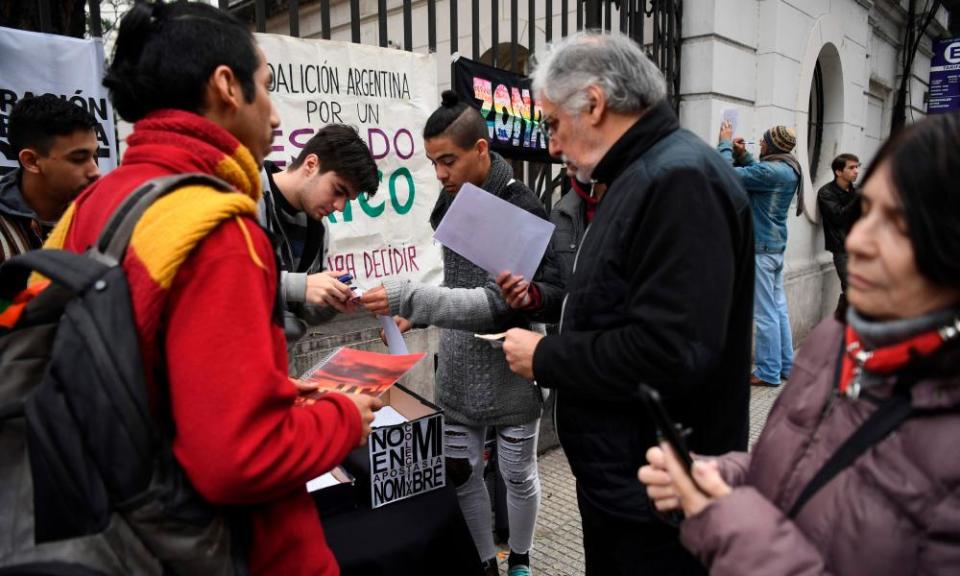Argentinians formally leave Catholic church over stance on abortion
More than 3,700 people submit apostasy requests in protest against anti-abortion campaign

Thousands of Argentinians – most of them women – have started formal proceedings to abandon the Catholic church, in protest of the church’s campaign against efforts to legalise abortion in the country.
In the month since the country's senate voted to maintain a ban on almost all abortions, more than 3,700 people have submitted apostasy applications to the Argentinian synod, according to César Rosenstein, a lawyer and founding member of the Argentinian Coalition for a Lay State.
The figure is a tiny percentage of Argentina’s population of 44 million, but apostasy activists say that the movement’s growing profile indicates a cultural shift in what has always been an overwhelmingly Catholic nation.
“Apostasy is an important symbolic and political act,” said Rosenstein, who said that visits to the group’s website had shot up since the vote from 100 daily unique users to around 40,000 a day.
The church strongly opposed the attempted reform. According to the Clarín newspaper, Pope Francis personally called on anti-abortion legislators to lobby their colleagues to reject the legislation; many senators invoked their Catholic faith during the 15-hour debate.
“I was born in 1974 and was baptised in a military chapel,” said journalist Soledad Vallejos, a member of the #NiUnaMenos feminist collective that campaigned strongly in favour of legal abortion. “[But] I’m not a believer and I don’t like the feeling that the church can claim to represent me because of a baptism in which I had no choice.”
In Argentina, 92% of the population describe themselves as Catholic – even though barely 20% practice their religion on a regular basis – and many express pride in a pope who once served as archbishop of Buenos Aires.
A constitutional reform in 1994 removed the requirement for Argentina’s presidents to be Catholic, but close ties remain between church and state. The Catholic church is financed to a large extent by the government. Bishops’ wages are paid by the state and Catholic schools receive state support, in accordance with a concordat signed in 1966 between the Vatican and Argentina’s 1966-70 military dictatorship and a decree passed by the country’s later 1976-83 dictatorship.
But a growing number of apostasy supporters express frustration with the church over its opposition to divorce and same-sex marriage (both of which nonetheless became legal in 1987 and 2010, respectively) as well as legal abortion.
The church’s ambivalent role during the 1976-83 military dictatorship is also a source of rancour.
“I’m offended by the church,” said Nora Cortiñas, a member of the Mothers of Plaza de Mayo, the campaigning group founded by women whose children vanished after being seized by the military, often being thrown alive into the south Atlantic from military planes.
“The priests blessed the death flights,” Cortiñas told the press recently, when she announced her plans to apostatise. “The church’s pressure against legal abortion was the drop that overflowed my cup.”
Last month’s vote leaves in place a law drawn up nearly a century ago that penalises women with up to four years in prison for undergoing an abortion – even though clandestine abortions are rife and a leading cause of maternal death in the country.
But the vote has also galvanised women’s rights campaigners, and provoked a new discussion around the Catholic church’s role in the country. Hundreds of people had signed apostasy forms at Cael’s street corner stalls around the country, Rosenstein said.
“Keep your rosaries out of my ovaries,” read an improvised sign at a Cael desk set up in downtown Buenos Aires.
Although the Catholic church usually responds to apostasy requests by annotating “Apostate” on the baptismal records of applicants, campaigners are demanding instead that their names be erased altogether from church registers – and that their baptismal certificates be physically destroyed.
“Although Argentina’s data protection law allows the church to keep personal data of its members, we are arguing that the personal data of people who no longer consider themselves members must be deleted from the church’s files altogether,” says Rosenstein.
• This article was amended on 9 September 2018. An earlier version said that bishops’ wages are paid by the state in accordance with a concordat signed by Argentina and the Vatican during Argentina’s 1976-83 dictatorship. The concordat was signed with a previous dictatorship in 1966 and bishops’ wages are paid in accordance with a decree of the 1976-83 dictatorship.

